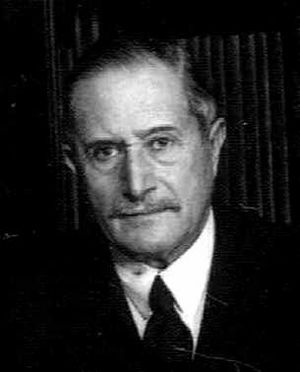Carlos Ibarguren facts for kids
Quick facts for kids
Carlos Ibarguren
|
|
|---|---|

Carlos Ibarguren
|
|
| Born |
Carlos Ibarguren
April 18, 1877 |
| Died | April 3, 1956 (aged 78) |
| Nationality | Argentine |
| Education | University of Buenos Aires |
| Occupation | Professor of law |
| Employer | University of Buenos Aires |
| Known for | Politician |
|
Notable work
|
Juan Manuel de Rosas (1930), Las sociedades literarias y la revolución argentina (1938), La historia que he vivido (1955) |
| Title | De facto Federal Interventor of Córdoba |
| Term | 1930 - 1931 |
| Predecessor | Basilio Pertiné |
| Successor | Enrique P. Torino |
| Political party | Democratic Progressive Party |
| Signature | |
 |
|
Carlos Ibarguren (born April 18, 1877 – died April 3, 1956) was an important Argentine academic, historian, and politician. He was known for his deep knowledge of Argentina's history. He was also an expert on the country's laws and government rules.
At first, he was part of a group of thinkers who believed in freedom and individual rights. Later in his life, his political ideas changed. He became interested in a strong form of nationalism, which focuses on the interests of one's own nation.
Early Life and Career
Carlos Ibarguren was born in Salta, Argentina, in 1877. His parents were Dr. Federico Ibarguren and Margarita Uriburu. He went to school in his hometown.
Later, he studied at the University of Buenos Aires. He earned a special degree in law in 1898. He became a professor of law at the same university.
Because he was so good at law, he started working for the government in 1904. He held several important positions. From 1910 to 1914, he served as the justice minister under President Roque Sáenz Peña.
After this, Ibarguren supported the Radical Civic Union party for a while. In 1914, he helped start the Democratic Progressive Party. He became its vice-president and helped write its plans. He often spoke out against the government of Hipólito Yrigoyen.
In 1922, he ran for president of Argentina. He did not win, getting about 7.7% of the votes.
Changing Political Views
At first, Carlos Ibarguren was known for his liberal ideas. These ideas focused on individual freedoms and rights. But after some political challenges in 1920, his views began to change.
His book from that year, La literatura y la gran guerra, showed his new interest in nationalism. He started to believe that democracy allowed too many different groups to have power. He thought that a strong, united conservative government was needed to guide the country.
Ibarguren became interested in ideas that were similar to fascism. He thought that ordinary people could be a strong force for traditional values. He believed they could help create a powerful, unified nation.
After a military takeover in 1930, led by General José Félix Uriburu, Ibarguren suggested a new economic plan called corporatism. This idea meant that different groups, like workers and businesses, would work together with the government. Later, in 1948, Juan Perón allowed these groups to be part of the parliament, following Ibarguren's advice.
Even with these ideas, Ibarguren did not hold many official jobs in the governments of Uriburu or Perón. He mostly focused on his work as a professor and writer. His last important political job was in Córdoba. He served as the De facto Federal Interventor of Córdoba from 1930 to 1931. Carlos Ibarguren passed away in Buenos Aires in 1956.
Writing and History
Carlos Ibarguren was especially famous for his books about Argentina's history. Some of his most well-known books include:
- Juan Manuel de Rosas (1930)
- Las sociedades literarias y la revolución argentina (1938)
- La historia que he vivido (1955)
He also served as the president of the Argentine Academy of Letters. This is a very respected group that promotes the Spanish language and literature in Argentina.
See also
 In Spanish: Carlos Ibarguren para niños
In Spanish: Carlos Ibarguren para niños
- Copa Ibarguren
 | William M. Jackson |
 | Juan E. Gilbert |
 | Neil deGrasse Tyson |

